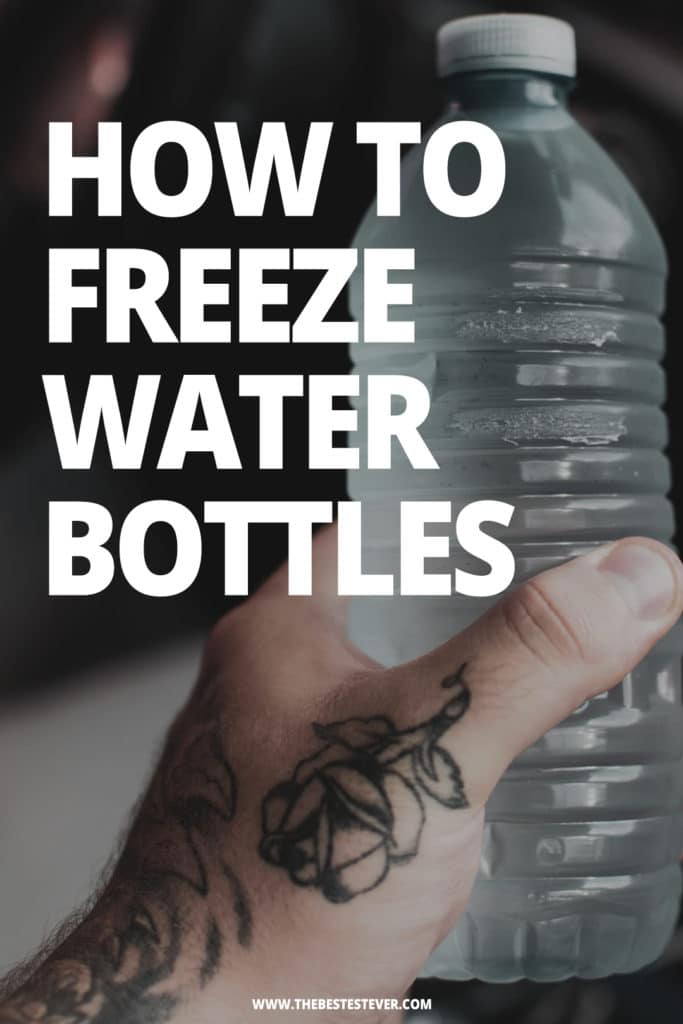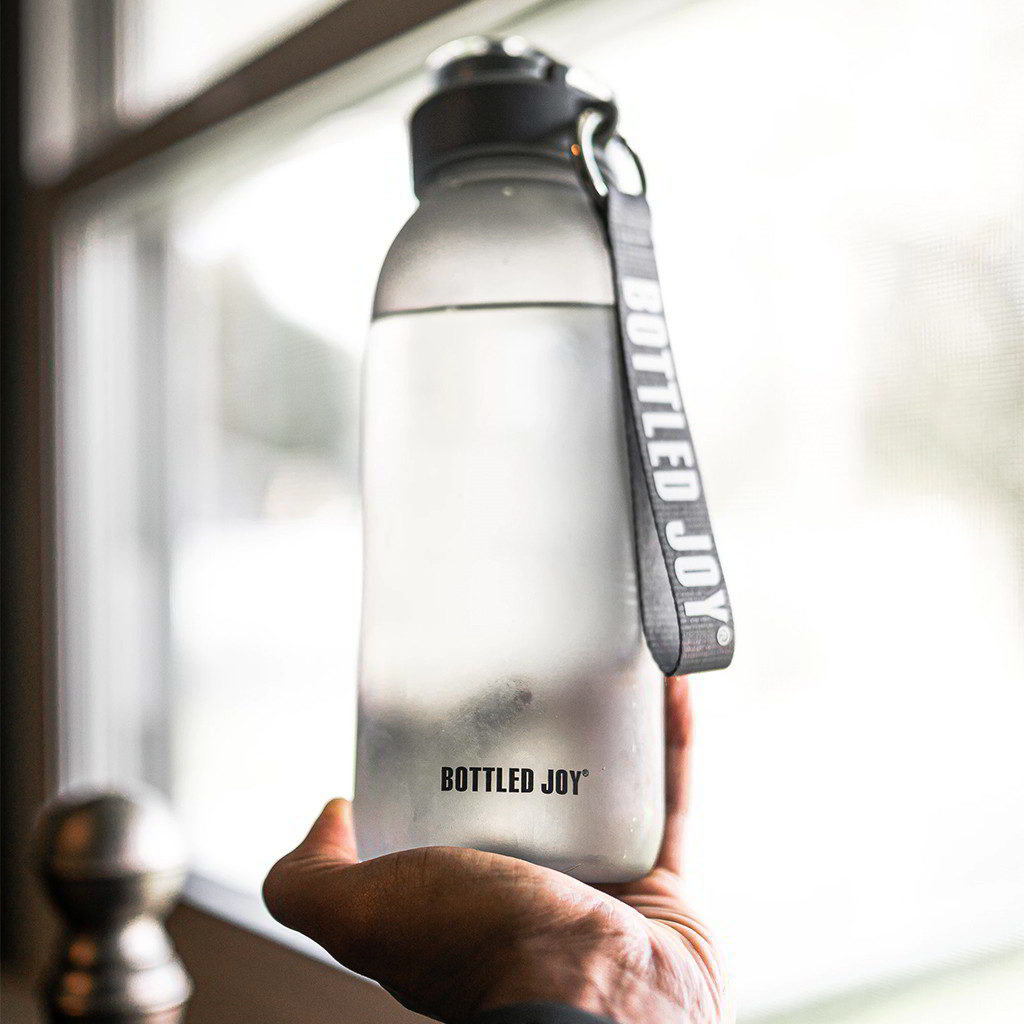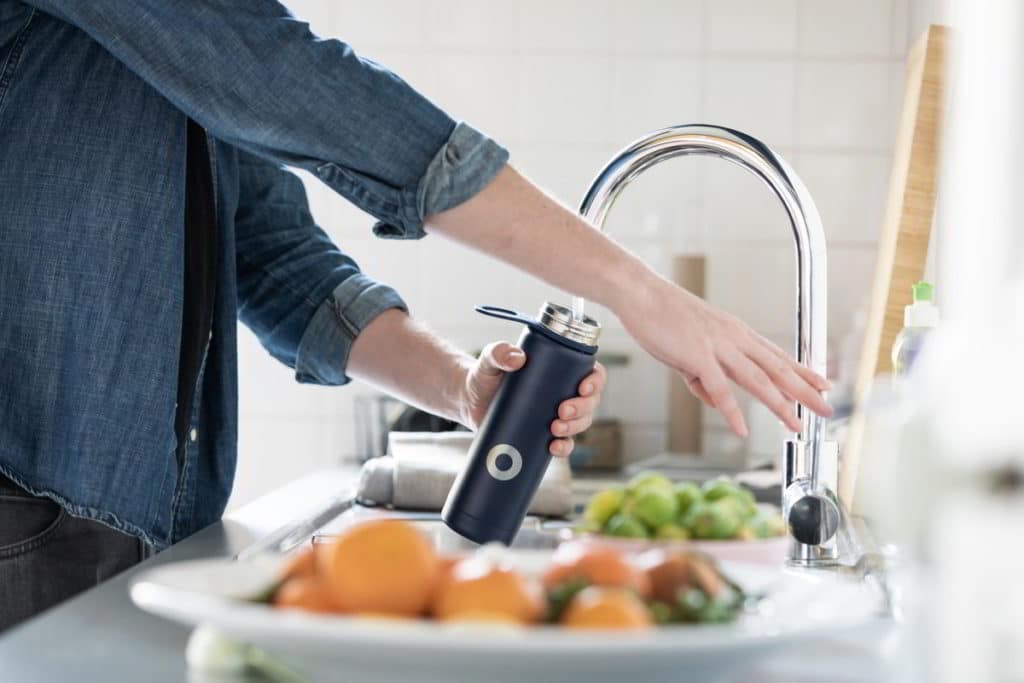
Want to know if you can freeze water bottles?
It depends.
In this guide, you will find out if it is possible to freeze the different types of water bottles from:
- Plastic
- Reusable plastic
- Stainless steel
- Glass
With that said, let us jump right into the article below.
Can You Freeze Water Bottles? Should You Be Doing This?
Yes, you can freeze water bottles, however, it depends on the type of bottle (we get into each below).
Freezing water bottles is a great way to ensure that you have cold water through the day or if you are going on a long road trip and need your water to stay cold in the cooler.
What Happens When Water is Frozen in Bottles?
To answer this, we have to dust off our chemistry books.
Freezing water is the process where it goes from a liquid to a solid.
According to Sicencing.com, Most substances contract, or shrink, in volume as they get cold. Water only contracts until it is lowered to 39 degrees F; at colder temperatures, it begins to expand.
As the water freezes, the container/bottle that holds the liquid will expand to accommodate the increase in volume of the ice.
It is at this stage that the container/bottle may burst, but that is dependent on a variety of factors.
We will now take a look at how each type of water bottle, holds up when frozen.
Freezing Plastic Water Bottles
As you know, water expands as it freezes into ice.
This generally is not a problem when freezing plastic water bottles.
The chance of them exploding is low (but it still can happen), as there is enough elasticity in the plastic water bottle to accommodate the in the increase in volume as the water expands.
How Do You Freeze Water Bottles Without Them Exploding?
I freeze plastic water bottles generally with no problems. However, there has been a time or two that a couple have burst open when freezing. The same can be said when freezing soda.
The reason was due to them being filled all the way to the top.
If you look at most sealed water bottles, you will see that there is some air space between the cap and the actual liquid.
When the bottle is placed in the freezer, this space allows for ice expansion, reducing the possibility of the bottle exploding.
You should always check sealed bottles for that air space, before freezing them.
If you are filling plastic bottles yourself, do not fill all the way to the top. Allow some space for the water to expand, so you do not end up with burst bottles once they freeze.
How Long Does it Take to Freeze a Plastic Water Bottle?
The time it takes to freeze a plastic water bottle will vary.
You can expect for it to freeze between 30 minutes to 2 hours, depending on the size of the water bottle and your freezer.
8-ounce plastic bottle of water – 30 minutes to 1 hour.
1-liter plastic bottle of water – up to 2 hours.
Freezing Reusable Plastic Bottles

Can you freeze your reusable plastic water bottle?
It really depends on the manufacturer of the bottle.
While plastic bottles, generally, can be frozen with no problems, reusable plastic bottles might be a different story.
It comes down to what the manufacturer recommends. It is a good idea to check their website or the instructions for the bottle and see if they have explicitly stated that it can or should not go in the freezer.
Reusable plastic bottles are made different ways and with different types of plastics.
There is a high chance you could damage or destroy the plastic bottle, so check before freezing.
Freezing Stainless Steel Water Bottles

So can your stainless steel water bottle go in the freezer?
No. While this is a blanket statement, generally, stainless steel water bottles should not be frozen.
What Happens When You Freeze Stainless Steel Water Bottles?
As we explained earlier, when water freezes, it expands.
While plastic water bottles have the elasticity to expand and accommodate the increase in volume of frozen water, stainless steel bottles, for the most part, do not.
The expanding liquid could cause the seals or welds that hold the water bottle to break or burst. Leaving it deformed or unusable.
Damage could also be done to the stainless steel bottle’s vacuum seal. This would cause the bottle to lose its insulating properties, meaning it would be unable to keep the water cold.
Some manufacturers have created bottles that can be frozen, this is why it is a good idea to check the instructions or the manufacturers website to see if you can or can’t place their stainless steel water bottles in the freezer.
Can You Freeze Water in Glass Bottles?
Glass water bottles are amazing as an eco-friendly alternative to plastic.
Glass keeps water tasting great and allows the liquid to stay colder for longer when it is outside of the refrigerator.
So is it possible to freeze glass water bottles?
The answer is, it depends.
Glass is very fragile and ideally you should not freeze any liquid in it, as there is a good chance the bottle could break (This has happened to me a couple of times).
However, this depends on the thickness of the glass bottle. Some bottles are really thick and can handle the expansion of the ice, which means it is harder for them to break.
Do I recommend freezing water in a glass bottle? I am going to say no. It is not worth it, trying to figure out if you can freeze water in it, especially since there is a high chance that it could break.
How to Freeze Water Bottles Instantly
Freezing water instantly is a neat little trick that can be used if you want to impress people or you are looking for a nice ice breaker (no pun intended) at a party. 🤪
These two videos do a pretty good job of showing the 2 methods that can be used to freeze water instantly.
If you are looking for a quicker method to show off and impress your friends, you can take a look at this process by Sick Science.
Wrapping it up
Now that we have reached the end of the article, you should have a better idea as it relates the freezing of water bottles, whether they are plastic, reusable plastic, stainless steel or glass.
Now it’s your turn!
I want to know what was your biggest takeaway from this article? Did you learn anything new? Was there something that stood out for you?
Whatever it is, let me know by leaving a comment below.